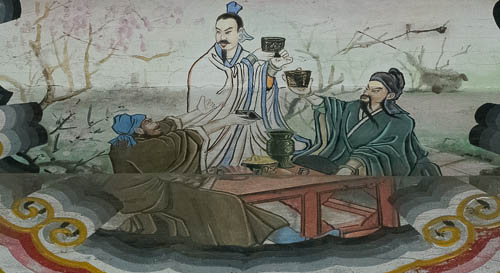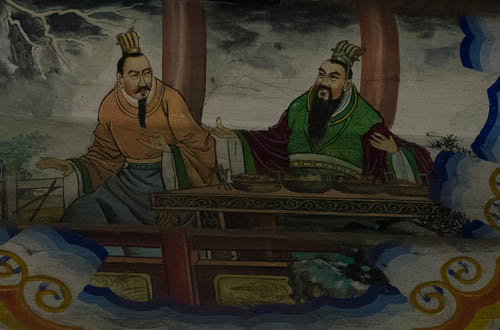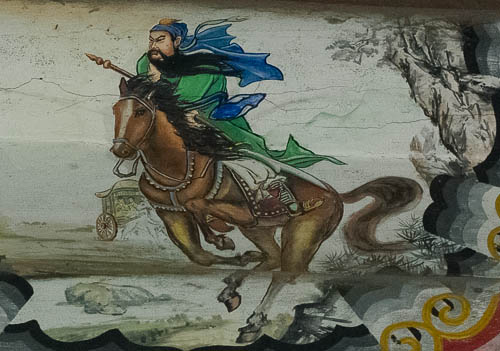Warlords and Generals Again
Yanjing informs me:

Here we see Liu Bei, Guan Yu, and Zhang Fei. These names are the keys to extensive information on Wikipedia. Their biographies and the many stories about them are indeed a pleasure to read.
Liu Bei was (I am quoting from Wikipedia now) “a war lord who founded the state of Shu Han in the Three Kingdoms period and became its first ruler. Despite having a later start than his rivals and lacking both the material resources and social status they commanded, Liu Bei overcame his many defeats to carve out his own realm, which at its peak spanned present-day Sichuan, Chongqing, Guizhou, Hunan, parts of Hubei, and parts of Gansu.” He died in 223. More here.
Guan Yu was a general who served under Liu Bei, and who helped him found the state of Shu Han. He is a cult figure, and – if we are to believe Wikipedia – worshipped as a deity by many Chinese. You can read about his life and exploits here. He died in 220.
Zhang Fei (who died in 221), was another general who served under Liu Bei. From Wikipedia: “Zhang Fei and Guan Yu, who were among the earliest to join Liu Bei, shared a brotherly relationship with their lord and accompanied him on most of his early exploits.” Read more here.

The next picture shows Cao Cao and Liu Bei. These were great antagonists in the period of the Three Kingdoms, each plotting to reduce the power of the other and achieve supremacy.
Cao Cao: read all about him on Wikipedia. “Cao Cao was a warlord and the penultimate Chancellor of the Eastern Han dynasty who rose to great power in the final years of the dynasty. As one of the central figures of the Three Kingdoms period, he laid the foundations for what was to become the state of Cao Wei and was posthumously honoured as”Emperor Wu of Wei“. Although he is often portrayed as a cruel and merciless tyrant in subsequent literature, Cao Cao has also been praised as a brilliant ruler and military genius who treated his subordinates like his family. He was also skilled in poetry and martial arts and wrote many war journals.” And here is more.

The final picture portrays Guan Yu again. The legend of Guan Yu’s escape from the province Wei is not under history on Wikipedia. But there is no need to despair. The internet is also a great resource for fiction. See here for how Guan Yu is depicted in The Romance of the Three Kingdoms.